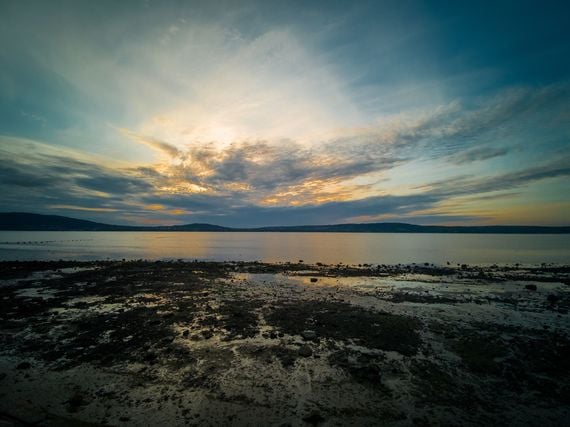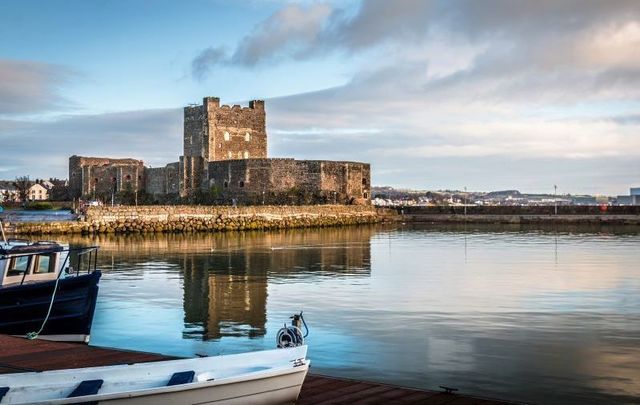Carrickfergus is one of the most beloved Irish songs, performed by hundreds of international artists, but why are the lyrics so confusing? ... Or are they?
"Carrickfergus" is one of the most haunting Irish melodies performed by hundreds of major artists from Joan Baez to Loudon Wainwright, to the Chieftains, Dubliners and the best version by Van Morrison. Ed Sheeran references it in "Galway Girl."
The song was also played as the climactic moment at the end of the Boardwalk Empire series on HBO.
Yet it remains a strangely mysterious song with confusing lyrics - or are they? The song seems to jump randomly between Carrickfergus and Kilkenny in southern Ireland, but it actually doesn’t.
The revival of it in modern times is put down to Hollywood Irish legend Peter O’Toole, who is said to have given the air and words to Dominic Behan, brother of Brendan, and a superb songwriter himself (“The Patriot Game.”)
The speculation is that O'Toole misheard or misremembered the actual lyrics which seems plausible but does not solve the issue of what the song is about (there are several message boards on the internet discussing this).
Here are the lyrics to "Carrickfergus" as most often sung:
“I wish I was in Carrickfergus
Only for nights in Ballygrant
I would swim over the deepest ocean
The deepest ocean, my love to find
But the sea is wide and I cannot swim over
And neither have I wings to fly
If I could find me a handsome boatman
To ferry me over my love and I.”
Second verse:
“My childhood days bring back sweet reflections
The happy times I spent so long ago
My boyhood friends and kind relations
Have all passed on now like melting snow
I'll spend my days an endless rover
Soft is the grass and sure, my bed is free
Oh but to be back, in Carrickfergus
To strike that lonely road, down by the sea.”
Third verse
“And in Kilkenny it is reported
On marble stone there as black as ink
With gold and silver I would support her
But I'll sing no more now till I get a drink
For I'm drunk today and I'm seldom sober
A handsome rover from town to town
Ah but I'm sick now my days are numbered
Come all ye young men and lay me down.”
Why does the song abruptly switch to Kilkenny? Well, actually it doesn't.
There is no Ballygrant in Ireland either.
So what gives?
A contributor known only as “Blade Thresher” on a Carrickfergus site explains much of the mystery.
“Carrickfergus is in Antrim. Ballygrant is across the Irish Sea on Islay in Scotland. 'But the water is wide…'
“Almost 80 miles of the turbulent North Irish Sea separate Carrickfergus from Ballygrant. You would definitely want a handsome (i.e., skillful) boatman to make that crossing.”

The wonderful seascapes at Carrickfergus, County Antrim.
It could also be a reference to joining his lover in death. In Greek mythology, Charon or Kharon is the boatman of Hades who carries the souls of the newly deceased across the River Styx.
Now in Kilmeny ... Kilmeny (not Kilkenny) is the parish in which Ballygrant is located. If the singer’s beloved had died in Ballygrant, Kilmeny Churchyard is where she likely would be buried. It has a noteworthy burial ground in which there are numerous black marble headstones.
- "…marble stones as black as ink." The black marble stones come from the nearby quarry, which was Ballygrant’s primary industry in the 18th and 19th centuries.
The unexplained "Kilkenny" reference is probably an artifact of mishearing, substituting the name of a well-known Irish city for a little-known Scottish parish. But Kilkenny has no logical connection with either Carrickfergus or Ballygrant.
"With gold and silver, I did support her" ... The other major employer in Ballygrant and Kilmeny Parish in the 18th and 19th centuries was lead and silver mining, which attracted miners from across the water. And Ballygrant lies over the Dalradian geologic complex, which is the source of gold being mined in Northern Ireland even today.
The second verse of the song was written by Behan himself and dovetails beautifully.
Sure there are still discrepancies, but it appears to be a lament written about a loved one buried in the graveyard in Scotland, the lyrics recalling their wonderful times together and now, feeling his life is at an end he remembers the old days fondly. It remains one of the most beautiful Irish airs and is now a little less obscure in its lyrics.
* Originally published in Aug 2019. Updated in August 2024




Comments